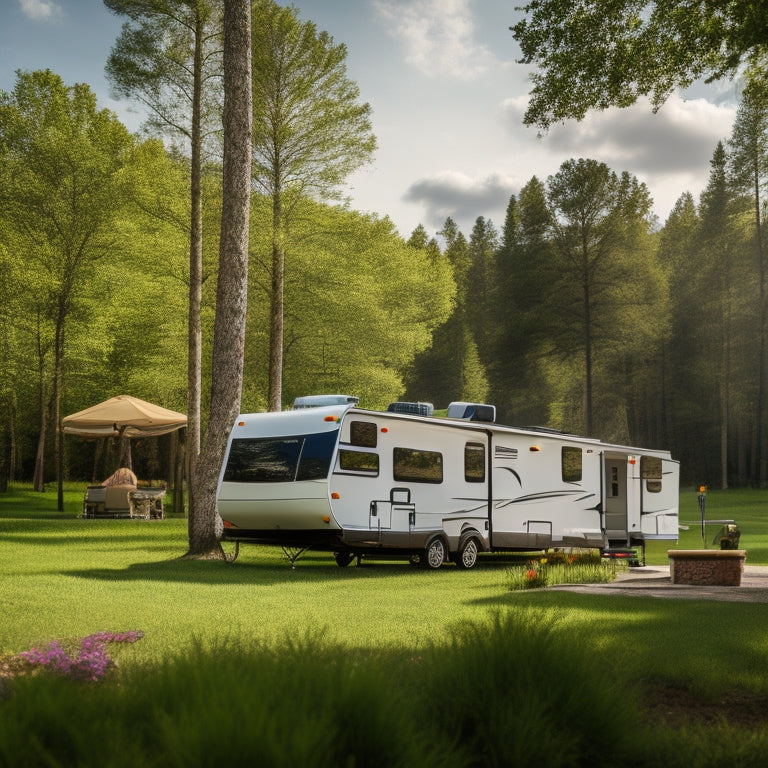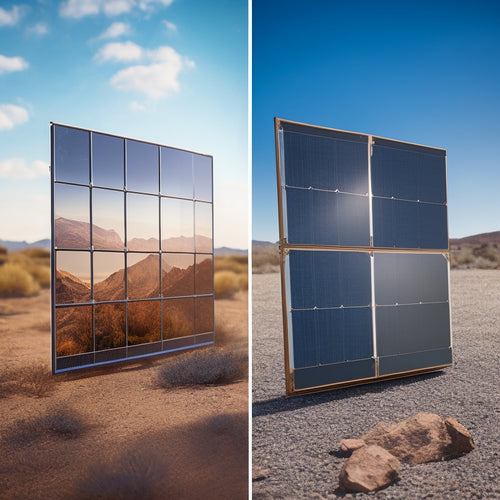
What Are the Best RV Battery Charging Systems?
Share
You need a reliable RV battery charging system that meets your power requirements, guarantees efficient energy storage, and provides a seamless camping experience. To achieve this, it is crucial to calculate your power needs, choose the right battery type, and select a suitable charging system. Consider converter chargers, on-board chargers, and solar chargers, each with its benefits and drawbacks. When selecting a system, look for features like multi-stage charging, automatic equalization, and safety features. By understanding your options, you'll be well on your way to finding the best RV battery charging system for your needs, and exploring further will reveal even more insights to optimize your setup.
Key Takeaways
• Consider a combination of converter chargers, on-board chargers, and solar chargers to meet your RV's power needs.
• Look for high-efficiency chargers with multi-stage charging, automatic equalization, and safety features for reliable battery charging.
• Choose a charger compatible with your battery type, size, and depth of discharge (DOD) to ensure safe and efficient charging.
• Monitor your RV's power system with real-time tracking, voltage monitoring, and power alerts to prevent failures and optimize performance.
• Upgrade to lithium-ion batteries for faster charging, longer lifespan, and improved depth of discharge, but consider compatibility and complexity.
Understanding RV Battery Needs
When you're preparing for a trip in your RV, understanding your battery needs is crucial to make sure you have enough power to support your appliances and accessories. You don't want to be stuck in the middle of nowhere without a working fridge or lights. To avoid this, you need to calculate your power requirements.
Start by making a list of all the devices you'll be using, including lights, laptops, and refrigerators. Then, research their power consumption in amp-hours (Ah) or watts (W). Add up the total power requirements to determine your battery capacity needs.
For example, if you have a 100W fridge that runs for 8 hours a day, you'll need a battery with a capacity of at least 800Wh (100W x 8h). Don't forget to take into account the battery's depth of discharge (DOD) - how much of the capacity you can safely use without damaging the battery.
A good rule of thumb is to size your battery to meet 2-3 times your daily power requirements. By doing your math, you'll make certain you have a reliable power supply on the road.
Types of RV Battery Chargers
As you explore the world of RV battery charging systems, you'll encounter various types of chargers designed to meet specific needs.
You'll want to understand the differences between converter chargers, on-board chargers, and solar chargers to make sure you're making an informed decision for your RV's power requirements.
In this section, we'll break down the characteristics, advantages, and limitations of each type to help you make the best choice for your RV's unique needs.
Converter Chargers Explained
You'll find converter chargers, also known as built-in chargers, integrated into many RVs, serving a dual purpose of converting AC power from the grid to DC power for your appliances and charging your RV's deep-cycle batteries.
These chargers are super convenient, but you should know what you're getting into. Converter chargers are often limited in their charging capacity, which can lead to longer charging times. Plus, they can be less efficient, wasting energy as heat. When it comes to power quality, converter chargers can introduce electrical noise, affecting the performance of your RV's appliances.
On the flip side, they're often more affordable and easier to install than other charging systems. To maximize charger efficiency, look for units with high power factors (>0.9) and low total harmonic distortion (<5%). These specs will make sure your converter charger is providing clean, stable power to your RV's electrical system.
On-Board Chargers Defined
On-board chargers, designed to reside within your RV, provide a dedicated charging solution for your deep-cycle batteries, offering more flexibility and performance compared to converter chargers. These chargers are specifically engineered to charge your batteries quickly and efficiently, ensuring you have the power you need when you need it.
As an RVer, you know how crucial it's to have a reliable charging system, and on-board chargers deliver. With an on-board charger, you can charge your batteries while on the go, making it perfect for boondockers and frequent travelers. These chargers are often compact and lightweight, making them easy to install and maintain.
Speaking of maintenance, it's vital to keep your on-board charger in top shape. Perform routine checks and clean the terminals to prevent corrosion. Regular charger maintenance is key to extending the lifespan of your batteries and ensuring excellent performance.
When selecting an on-board charger, consider the Onboard Essentials: a high-quality charger that can handle the demands of your RV's electrical system. Look for a charger with advanced features like multi-stage charging, automatic equalization, and built-in safety protections.
Solar Chargers Reviewed
Your RV's battery bank can greatly benefit from the free energy of the sun with a solar charger, a type of battery charger that converts sunlight into electrical energy to recharge your deep-cycle batteries. By harnessing the power of the sun, you can extend your off-grid adventures and reduce your reliance on noisy generators.
Here are some key things to keep in mind when selecting a solar charger:
-
Don't fall for solar myths: just because you have a solar charger doesn't mean you can overlook your battery maintenance. Keep an eye on your water levels and electrolyte specific gravity!
-
Avoid common charger mistakes: make sure your solar charger is compatible with your battery type and size to prevent overcharging or undercharging.
-
Size matters: choose a solar charger that can keep up with your energy demands, but don't oversize it or you'll waste money and space.
-
Mounting options are important: consider the flexibility and adjustability you need to ensure your solar panels get maximum sunlight.
-
Monitor your performance: invest in a monitoring system to track your energy production and consumption, and make adjustments as needed.
Benefits of Solar Power Systems
Solar power systems offer a reliable and renewable energy source, freeing you from reliance on noisy generators and reducing your carbon footprint while camping off-grid. You'll no longer have to worry about disturbing the peace or contributing to air pollution. With solar power, you can enjoy the great outdoors while doing your part for the environment.
As a renewable energy source, solar power systems provide a clean and sustainable way to charge your RV batteries. You'll be producing zero emissions, reducing your impact on the environment, and doing your part to combat climate change. Plus, with the cost of solar panels decreasing, it's more affordable than ever to make the switch.
Imagine being able to camp off-grid for extended periods without worrying about running out of power. Solar power systems make it possible, giving you the freedom to explore the great outdoors without sacrificing your comfort or values. With the benefits of solar power, you can have a guilt-free camping experience that's good for you and the planet.
Top Brands for RV Solar Panels
When outfitting your RV with a reliable solar power system, you'll want to explore leading brands like Renogy, Zamp, and HQST, which have established themselves as industry leaders through their high-quality products and innovative designs. These brands have made a name for themselves in the renewable energy space, offering efficient installations that will keep your batteries charged and your adventures powered.
Here are some key highlights from these top brands:
-
Renogy: Known for their high-efficiency solar panels and complete solar kits that make installation a breeze.
-
Zamp: Offers a range of solar panels and charging systems designed specifically for RVs, with a focus on durability and reliability.
-
HQST: Provides affordable and efficient solar panels and charging systems, perfect for RV owners on a budget.
-
Rich Solar: Specializes in high-quality, American-made solar panels that are built to last.
-
Windynation: Offers a range of solar panels and charging systems, including DIY kits for the more adventurous RV owner.
These brands have earned their reputation for providing excellent solar panels and charging systems, ensuring you can stay powered up and connected on the open road.
Inverter-Converter Combos Explained
As you explore inverter-converter combos, you'll want to understand how they work, what benefits they offer, and what key components make them tick.
Fundamentally, these systems combine the functions of an inverter, which converts DC power to AC, with a converter, which charges your RV's batteries from an external power source.
How It Works
Your inverter-converter combo receives DC power from your RV's batteries and converts it to AC power for your appliances, while simultaneously charging your batteries from an external power source when available. This versatile combo is the brain of your RV's electrical system, ensuring your batteries stay healthy and your appliances run smoothly.
Here are the key functions of an inverter-converter combo:
-
Efficient Power Conversion: Converts DC power to AC power for your appliances, with minimal energy loss.
-
Smart Battery Charging: Monitors and controls the charging process to prolong battery life and reduce the number of charging cycles.
-
Automatic Switching: Seamlessly switches between AC power sources, such as shore power or generator power, to keep your appliances running.
-
Battery Protection: Prevents overcharging or undercharging, which can damage your batteries and shorten their lifespan.
-
Real-time Monitoring: Provides you with essential information on your RV's electrical system, so you can stay on top of things.
Benefits and Features
With an inverter-converter combo, you can enjoy a wide range of benefits and features that enhance your RVing experience. For starters, you'll appreciate the energy efficiency of these systems, which means you'll waste less power and get more bang for your buck. This is especially important when you're boondocking or dry camping, and every watt counts.
Plus, with a combo system, you'll enjoy improved power reliability, which means fewer headaches and more time to focus on the fun stuff – like exploring the great outdoors.
Another perk is the ability to charge your batteries quickly and efficiently, which is a major plus when you're on the go. And, with many modern combos, you'll get advanced features like automatic generator start, which kicks in when your batteries need a boost.
Some combos even come with built-in transfer switches, which eliminate the need for separate components. All in all, an inverter-converter combo is a smart investment for any serious RVer, offering a perfect blend of performance, convenience, and peace of mind.
Key Components
You'll need to understand the key components of an inverter-converter combo to maximize its benefits, and that starts with the inverter itself, which converts DC power from your batteries into AC power for your appliances. This is where the magic happens, allowing you to power your laptop, coffee maker, or even a hair dryer while off-grid.
Here are the other essential components to take into account:
-
Converter: Charges your batteries from an external power source, like a generator or shore power.
-
Charge Controller: Regulates the flow of energy from your solar panels or wind turbines to your batteries, ensuring Battery Durability.
-
Monitoring System: Keeps you informed about your battery state, voltage, and charging status, enabling System Integration for a seamless experience.
-
Transfer Switch: Automatically switches between different power sources, ensuring a continuous supply of power to your appliances.
-
Grounding System: Ensures the safe operation of your electrical system, protecting you and your RV from electrical shocks.
Choosing the Right Battery Type
Choosing the appropriate battery type for your RV's charging system is crucial, as it directly affects the overall performance and longevity of your batteries. You want batteries that can keep up with your adventures, not leave you stranded in the middle of nowhere. When selecting the right battery type, consider factors such as battery lifespan, durability, and maintenance requirements.
Here's a quick comparison of three common RV battery types:
| Battery Type | Battery Lifespan | Maintenance Needs |
|---|---|---|
| Flooded Lead-Acid | 5-7 years | High (watering required) |
| AGM (Absorbed Glass Mat) | 7-10 years | Low (maintenance-free) |
| Lithium-Ion | 10-15 years | Very Low (no maintenance) |
As you can see, each battery type has its pros and cons. Flooded lead-acid batteries are budget-friendly but require regular watering. AGM batteries offer a good balance between performance and maintenance. Lithium-ion batteries are the crème de la crème, but come at a higher cost. By choosing the right battery type, you'll be ensuring a reliable power supply for your RV adventures.
Deep Cycle Battery Maintenance
Proper maintenance is key to extending the lifespan of your deep cycle batteries, and a well-planned routine can help prevent premature failure. You invested in those batteries, and now it's time to give them some TLC to make sure they perform at their best. By following these simple steps, you'll be able to monitor and maintain your deep cycle batteries' health.
Here's what you need to do:
-
Check water levels: Make sure the electrolyte levels are adequate to prevent plate corrosion and guarantee proper function.
-
Monitor battery voltage: Keep an eye on your battery's state of charge to prevent over-discharging, which can reduce its lifespan.
-
Avoid deep discharging: Try to keep your batteries above 50% charge to prevent deep discharging, which can reduce the cycle count and overall battery health.
-
Equalize your batteries: Periodically equalize your batteries to prevent sulfation and ensure all cells are balanced.
-
Keep them clean: Clean the terminals and connections to prevent corrosion and ensure good electrical connections.
Solar Charge Controller Options
When it comes to harnessing solar power for your RV's batteries, you'll need a reliable solar charge controller to regulate the energy flow.
You'll want to explore options like MPPT (Maximum Power Point Tracking) charge controllers, which optimize energy harvesting, and PWM (Pulse Width Modulation) controllers, which offer efficient charging.
Additionally, you'll need to guarantee overcharge protection to prevent battery damage and maintain a healthy charging system.
MPPT Charge Controllers
You'll often find MPPT (Maximum Power Point Tracking) charge controllers in solar-powered RV battery charging systems. They're designed to optimize energy harvest by continuously monitoring and adapting to the ever-changing voltage and current output of your solar panels. This smart technology guarantees you get the most out of your solar setup, even on cloudy days or during periods of partial shading.
Here are some key benefits of MPPT charge controllers:
-
Efficiency Optimization: MPPT controllers can increase your solar panel's energy output by up to 30% by continuously tracking the maximum power point.
-
Power Maximization: By optimizing energy harvest, you'll have more power available for your RV's electrical systems.
-
Flexibility: MPPT controllers can handle a wide range of solar panel configurations and battery types.
-
Reliability: They're built to last, with features like overcharge protection and short-circuit prevention.
-
Easy Monitoring: Many MPPT controllers come with built-in monitoring capabilities, so you can keep an eye on your system's performance.
PWM Charge Efficiency
As an alternative to MPPT technology, pulse-width modulation (PWM) charge controllers offer a more cost-effective solution for solar-powered RV battery charging systems. You might be wondering, how do PWM charge controllers work? In essence, they regulate the energy harvesting process by rapidly switching the solar panel's output on and off to match the battery's voltage. This process, known as pulse-width modulation, allows the controller to adjust the energy flow to optimize charging efficiency.
Here's a comparison of PWM charge controllers:
| Feature | PWM Charge Controller |
|---|---|
| Cost | Lower than MPPT controllers |
| Efficiency | Up to 95% efficient |
| Compatibility | Suitable for most RV battery systems |
| Complexity | Less complex than MPPT controllers |
| Performance | Ideal for smaller solar arrays |
While PWM charge controllers may not be as efficient as MPPT controllers, they offer a more affordable option for RV owners. By leveraging pulse-width modulation, PWM controllers can still provide reliable energy harvesting, making them a viable choice for solar-powered RV battery charging systems.
Overcharge Protection
To prevent battery damage and guarantee a prolonged lifespan, your solar-powered RV battery charging system requires a reliable overcharge protection mechanism, which is often integrated into the solar charge controller. This feature prevents your batteries from getting overcharged, which can lead to reduced performance, overheating, and even complete battery failure.
Here are some key aspects to keep in mind when it comes to overcharge protection:
-
Voltage Limits: The controller should be able to detect when the battery voltage reaches a certain threshold, and then reduce or stop the charging process to prevent overcharging.
-
Smart Regulation: A good solar charge controller should be able to adjust the charging current based on the battery's state of charge, to prevent overcharging and ensure efficient charging.
-
Multi-Stage Charging: Look for a controller that offers multiple charging stages, including bulk, absorption, and float stages, to ensure your batteries are charged safely and effectively.
-
Automatic Equalization: This feature helps to balance the voltage across each battery cell, preventing overcharging and extending the lifespan of your batteries.
-
Real-Time Monitoring: A good overcharge protection system should provide real-time monitoring and alerts to notify you of any issues or anomalies in the charging process.
Monitoring Your RV's Power System
Your RV's power system relies on accurate monitoring to prevent battery drain, electrical overloads, and system failures. Without a clear picture of your energy usage, you risk being stranded in the middle of nowhere with dead batteries. Luckily, advanced monitoring systems can keep you informed and in control.
| Feature | Purpose | Benefits |
|---|---|---|
| Power Alerts | Receive notifications when your batteries are fully charged or discharged | Avoid overcharging, undercharging, and electrical overloads |
| Energy Tracking | Monitor your energy usage in real-time | Identify areas for improvement, optimize your energy consumption |
| Voltage Monitoring | Track your battery voltage to prevent damage | Extend the lifespan of your batteries, prevent electrical failures |
| Historical Data | Access detailed records of your energy usage | Identify patterns, optimize your energy consumption, and make data-driven decisions |
Upgrading to Lithium-Ion Batteries
You can greatly enhance your RV's power system by upgrading to lithium-ion batteries, which offer substantial improvements in performance, efficiency, and lifespan compared to traditional lead-acid batteries. This upgrade can be a game-changer for RV enthusiasts who want to boost their off-grid capabilities and reduce their reliance on noisy generators.
Here are some key benefits of lithium-ion batteries:
-
Lighter and more compact: Lithium-ion batteries are notably lighter and more compact than their lead-acid counterparts, making them ideal for RVs where space is limited.
-
Faster charging: Lithium-ion batteries can charge up to 5 times faster than lead-acid batteries, getting you back on the road sooner.
-
Longer lifespan: Lithium-ion batteries can last up to 5 years or more, compared to the 2-3 year lifespan of lead-acid batteries.
-
Improved depth of discharge: Lithium-ion batteries can handle deeper discharges without damaging the battery, making them perfect for heavy-use RV applications.
-
Increased safety: Lithium-ion batteries are designed with built-in safety features, reducing the risk of overheating and electrical shock.
Frequently Asked Questions
Can I Mix Old and New Batteries in My Rv's Battery Bank?
"Don't mix old and new batteries in your RV's bank, as differing ages and capacities disrupt bank balance, causing charging issues and reducing overall performance - it's a recipe for battery chaos, trust us, you won't like the results!"
How Often Should I Equalize My Deep Cycle Batteries?
You should equalize your deep cycle batteries every 1-3 months, depending on charging cycles, to prevent water damage and maintain peak battery health; stick to a strict maintenance schedule to guarantee your batteries don't drain your RV's vibes.
Will a Higher Wattage Solar Panel Charge My Batteries Faster?
You're wondering if a higher wattage solar panel will charge your batteries faster? Well, it's not that simple. Solar efficiency and panel sizing play a bigger role than just wattage; you'll need to take into account your system's overall design to maximize charging speed.
Can I Use a Car Charger to Charge My Rv's Deep Cycle Batteries?
'You're wondering if you can use a car charger to juice up your RV's deep cycle batteries, right? Not so fast! Confirm charger compatibility to avoid battery safety risks - don't risk a blown battery or worse, a fire!'
Will a Lithium-Ion Battery Work With My Existing Charger?
You're wondering if your existing charger will play nice with a lithium-ion battery upgrade - short answer, probably not. Lithium batteries require specialized charging profiles, so you'll likely need a charger upgrade for seamless compatibility.
Related Posts
-

Why Cheap Solar Panels Aren't Always the Best
When opting for cheap solar panels, you're likely sacrificing quality and reliability for upfront savings. However, y...
-

What Does Solar Panel Maintenance Really Cost?
You can expect to pay between $1,500 to $2,500 per year for solar panel maintenance, with costs influenced by your sy...
-

7 Best Financial Incentives for Residential Homeowners
You're entitled to a range of financial incentives that can help offset the costs of owning a home, from federal tax ...


